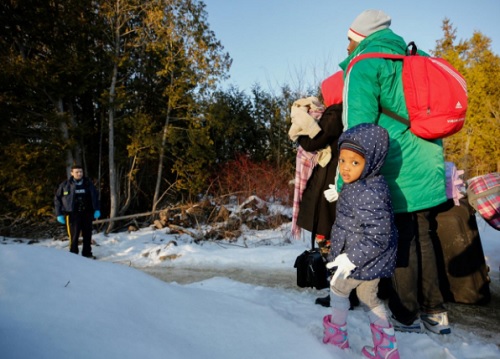TORONTO (Reuters) - Buffered by three oceans and the United States to the south, Canada has for decades had the luxury of being able to pick and choose its newcomers. So few asylum seekers crossed the U.S. border illegally over the years that Canada didn’t consistently track the numbers.
That has changed dramatically over the past 14 months. U.S. President Donald Trump’s crackdown on illegal immigration and his move to strip Haitians, Salvadorans and others of their temporary legal status have had a broad effect on Canada’s refugee system, Reuters interviews with social service providers, government officials and a review of Canadian immigration data show.

A girl waits with her family before crossing the US-Canada border into Canada in Champlain, New York, U.S., February 14, 2018. REUTERS/Chris Wattie
More than 20,000 people, including thousands of Haitians and Nigerians and hundreds of Turks, Syrians and Eritreans, have crossed the border into Canada illegally over the past year in search of asylum, many fleeing in fear that Trump would deport them to their home countries.
This unexpected northward migration has overwhelmed Canada’s system for processing asylum claims, leading to the worst delays in years. Aid agencies are also struggling to house asylum-seekers because of a shortage of accommodation in the four cities most affected by the migration wave - Toronto, Montreal, Winnipeg and Vancouver.
While some of this has been reported, this story offers the most complete picture to date of the unintended effect of Trump’s immigration policies on the United States’ northern neighbor.
The Canadian government was forced to set aside C$173 million in its latest budget to pay for extra patrols at border crossings to cope with the influx, as well as security screening and processing of refugee applications.
Prime Minister Justin Trudeau’s government has discussed the situation with the Trump administration, but it has been careful not to publicly blame the U.S. president’s policies for triggering the migration wave. Nevertheless, it is already making preparations for more people to cross the border once the weather warms.
“We will be ready,” Immigration and Refugee Minister Ahmed Hussen said in an interview.
Leave Comments